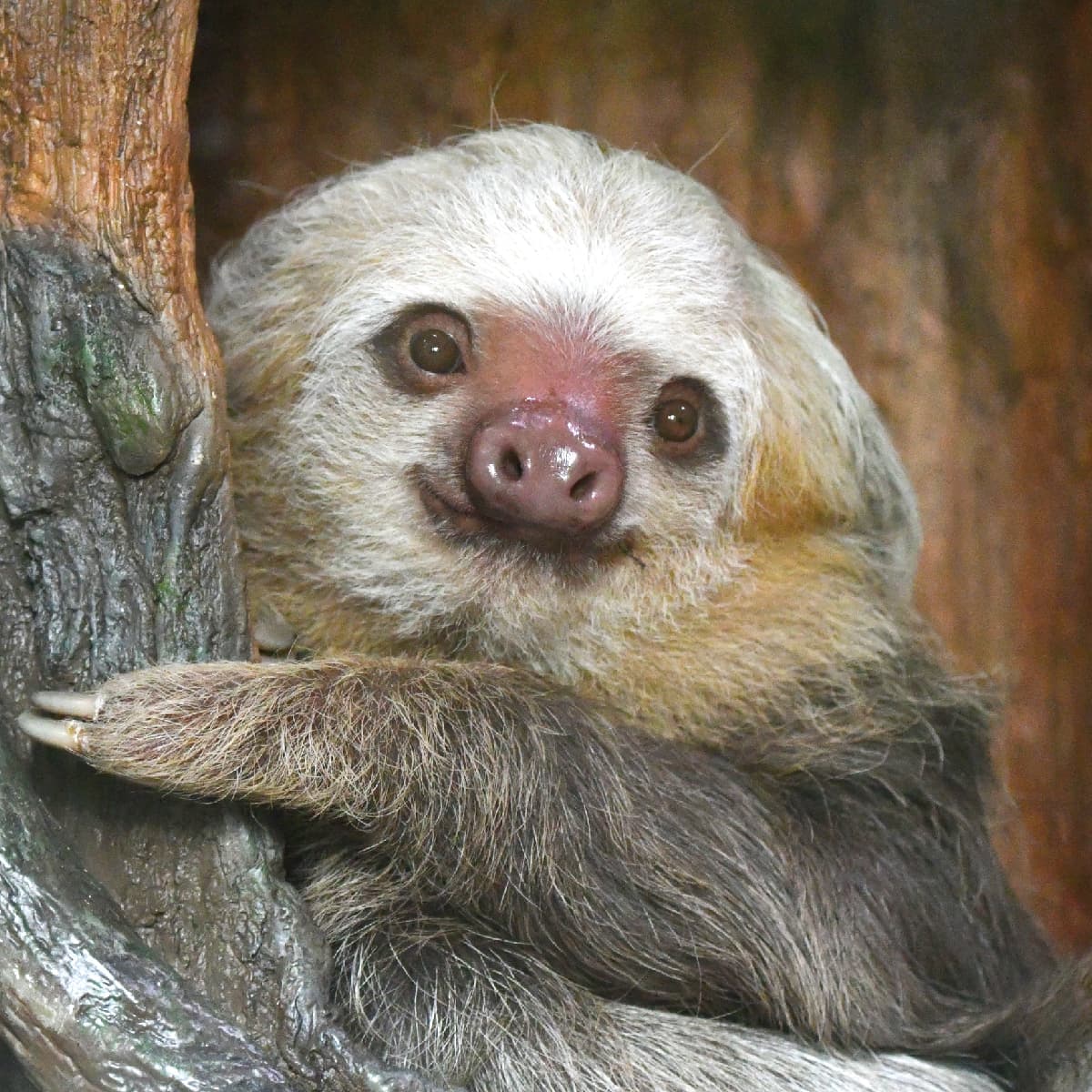
Pin on Sloths
People who have Down syndrome have learning difficulties, mental disability, a characteristic facial appearance, and poor muscle tone (hypotonia) in infancy. Individuals with Down syndrome also have an increased risk for having heart defects, digestive problems such as gastroesophageal reflux or celiac disease, and hearing loss.

Hoffman's Twotoed Sloth Saint Louis Zoo
Infants with Down syndrome have a 62-fold higher rate of pneumonia, especially in the first year after birth, than do infants without Down syndrome, for example. 2 Hypothyroidism. The thyroid is a gland that makes hormones the body uses to regulate things such as temperature and energy.

Top 157 + Animals with down's
[ Read summary ] Researchers estimated that in 2008 about 1 out of every 1,200 people (children, teens, and adults) living in the United States had Down syndrome. This means that in 2008 about 250,700 children, teens, and adults were living with Down syndrome in the United States. [ Read summary ]
YOUTH AND BIODIVERSITY Recent Wildlife In my Neighbourhood (Panama)
Poor muscle tone or loose joints Shorter in height as children and adults How Many Babies are Born with Down Syndrome? Down syndrome remains the most common chromosomal condition diagnosed in the United States. Each year, about 6,000 babies born in the United States have Down syndrome.

Shaking hands with Buttercup, 50 years old sloth orphane Flickr
Down syndrome or Down's syndrome, also known as trisomy 21, is a genetic disorder caused by the presence of all or part of a third copy of chromosome 21. It is usually associated with developmental delays, mild to moderate intellectual disability, and characteristic physical features. There are three types of Down syndrome, all with the same features: Trisomy 21, the most common type; Mosaic.

Pin em Sloths
1 Sep 2022. 4:10 PM ET. By Emily Underwood. A hormone that boosts memory in mice may hold promise for adults with Down syndrome. Halfpoint/iStock. New research with mice—and a small human trial—raises the prospect of treatments that could improve learning difficulties in people with Down syndrome. Though still preliminary, the work may.

Pin on AW
Down syndrome affects about one out of every 700 babies born in the United States, which is approximately 6,000 live births per year. More than 200,000 people in the United States are currently living with this condition. The incidence of Down syndrome has remained stable within the population.

down syndrome mom awareness yellow blue ribbon unique sloth t shirt men Buy tshirt designs
According to Wikipedia.org - "Down syndrome (DS or DNS), also known as trisomy 21, is a genetic disorder caused by the presence of all or part of the third copy of chromosome 21. It is typically associated with physical growth delays, mild to moderate intellectual disability, and characteristic facial features.

Sloth is Suffering From TSS Tired Sloth Syndrome. YouTube
The symptoms of Down syndrome vary from person to person, and people with Down syndrome may have different problems at different times of their lives. Physical Symptoms. Common physical signs of Down syndrome include 1, 2: Decreased or poor muscle tone; Short neck, with excess skin at the back of the neck; Flattened facial profile and nose

This is a sloth bear. He is awesome. r/aww
Screening for Down syndrome is offered as a routine part of prenatal care. Although screening tests can only identify your risk of carrying a baby with Down syndrome, they can help you make decisions about more-specific diagnostic tests. Screening tests include the first trimester combined test and the integrated screening test.

17 Sloth Facts Fact Animal
Trisomy 21: In this type of Down syndrome, each cell in the body has three separate copies of chromosome 21 instead of the usual 2 copies. About 95% of people with Down syndrome have this type. Translocation Down syndrome: This occurs when an extra part or a whole extra chromosome 21 is present, but it is attached to a different chromosome ("trans-located") rather than being a separate.
Adorable Portraits of Rescued Baby Sloths PetaPixel
Down Syndrome - StatPearls - NCBI Bookshelf HHS Vulnerability Disclosure Down syndrome was first described by an English physician John Langdon Down in 1866, but its association with chromosome 21 was established almost 100 years later by Dr. Jerome Lejeune in Paris.

Smithsonian Insider Discover sloths in a whole new way! Smithsonian Insider
What is Down Syndrome? Down syndrome, also known as Down's syndrome, trisomy 21, or (formerly) mongolism is a condition that is caused due to the presence of an extra copy of chromosome 21 in the cells of the body. Due to this extra genetic material it causes mental disability, various health problems, and also some unique physical features.

Sloth With Down Syndrome Quotes
Down syndrome is a genetic condition, but it isn't hereditary. Neither trisomy 21 nor mosaicism is inherited from a parent. These cases of Down syndrome are the result of a random cell division.
Rabid Sloth YouTube
Down syndrome (sometimes called Down's syndrome) is a condition in which a child is born with an extra copy of their 21st chromosome — hence its other name, trisomy 21. This causes physical.

Hater Syndrome 3 Sloth YouTube
While the notion of animals with Down syndrome is a myth, apes are the one animal that seems to sometimes exhibit a genetic defect at least comparable to Down syndrome. Apes have 24 pairs of chromosomes as opposed to humans' 23 and some apes have been diagnosed with having an extra copy of chromosome 22, which is similar to chromosome 21 in humans.